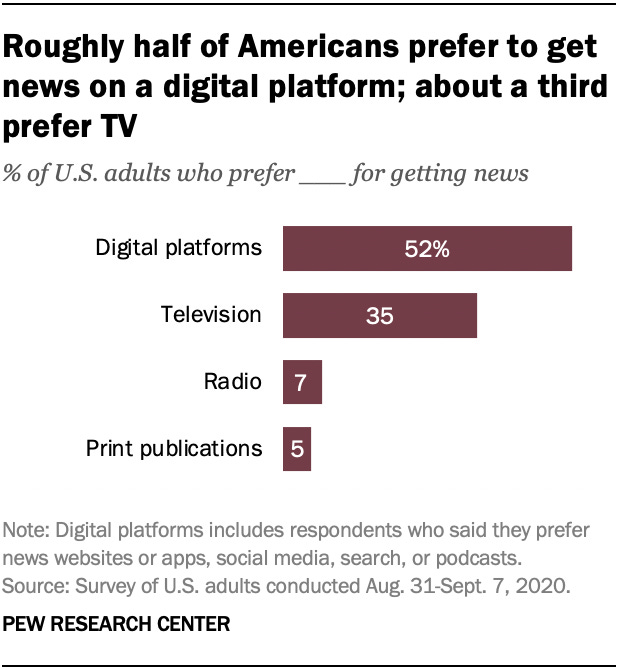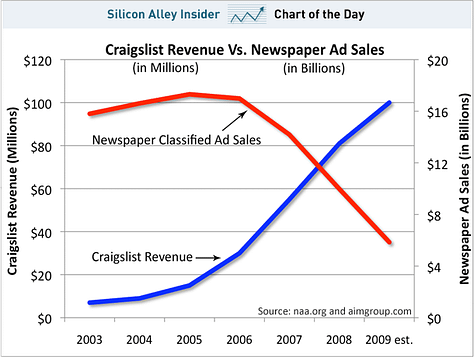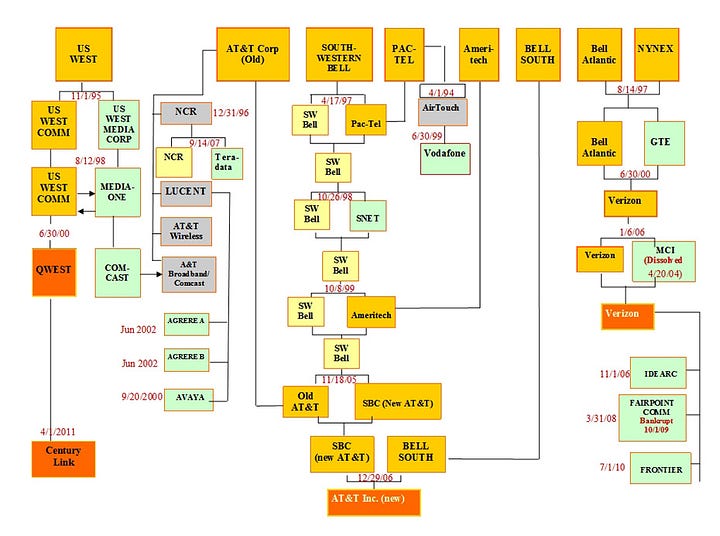According to Pew research, over 80 million Americans go to YouTube for news content as well as social commentary; 26% of Americans, to say nothing of billions of people globally, are using the YouTube platform to consume news. Pew also reports that two-thirds of American adults get news from Google.
About half, 53%, get news from social media sites like X or Facebook; only 22% get news from podcasts, which is less than half the number who still get theirnews from the radio, presumably on their commutes.
Television continues to decline; the internet is king.


Google, which accounts for over 95% of the global search engine ad market, and owns YouTube, which is the second largest search engine by traffic behind Google, monetizes all of that content for itself when it sells advertisements to help it generate revenues that it feeds to Google’s parent company Alphabet.
It even profits from Rumble, which was created as a censorship free YouTube competitor, but is still part of the Google Video Partners network, which allows them to collect ad dollars from YouTube advertising campaign budgets.
Rumble, for its part, claims that Google’s ad network now accounts for less than 1% of its revenue; it launched its own advertising platform in beta in 2022 with a full rollout in 2023, "to further insulate itself and its shareholders from Big Tech."
Revenue for the 842 local TV stations defined as “news-producing stations” (stations that have a news director and are viable, commercial and are English-language affiliates in the U.S.) was $16.9 billion, according to the BIA Advisory Services database.
Pew Research Center estimates that the total advertising revenue for the newspaper industry in 2022 was $9.8 billion, based on their analysis of financial statements from publicly traded newspaper companies.
Advertising revenues for the evening broadcast news programs of national networks was an estimately $380 million.
Added together, this is roughly $27 billion dollars in revenue. Google had just over $307 billion in revenue for fiscal year 2023, with over $200 billion of that generated from advertising across its platforms. There is no way to tell how much of this was pilfered from news organizations, but Pew’s studies suggest newspapers lost over 65% of their ad revenue from 2006 to 2017 even accounting for revenue gained from digital properties..
Network news has fared better, presumably at least partly because YouTube, which has 97% market penetration in internet video, seems to favor these huge media conglomerates over independent journalists.
Google aggregates their content as well, but Google also outearns all of them combined by hundreds of billions of dollars, in part by monetizing their content.
The greatest negative impact has been on local and regional newspapers, though it has also affected large national outlets like the New York Times and the Washington Post.
Pew Trust has reported that newsroom employees in both print and video outfits - mainly, reporters, editors, photographers, and videographers - declined nationwide by 23% in the decade from 2008 to 2018.
Newspapers lost close to half of their newsroom employees over those same 10 years (from about 71,000 workers to 39,000). Little wonder that American trust in the media is at all time lows.
Craigslist, Facebook, and other similar sites that allow for digital facsimiles of classified ads have also had a massive negative impact on local news; Facebook only crossed $100 billion in revenue in the last few years, and has exited the news business itself entirely, creating entirely new issues for the already beaten and battered media that now gets most of its attention from social networks and search engines.



This has decimated advertising revenues for the print news media, which peaked at $50 Billion around the turn of the millenium before falling off a cliff, and created a vicious cycle where in particular local newsrooms have less money to employ journalists to research stories, resulting in lower quality reporting, which results in further circulation declines, which results in lower ad revenue.
From the turn of the millenium too 2022, over 2,000 local print newspapers closed their doors in America, and the number of American newspaper journalists was cut more than in half.
"Power is shifting to the individual journalist from the news outlet with more people seeking out names through search, e-mail, blogs and social media," industry publication Editor & Publisher has noted.
This has accelerated the trend of news as infotainment, resulting in heavily niche-ified content with little consistency in either quality, revenue or integrity. The best paid “journalists” of the information age have so far been comedians and conspiracy theorists.
Journalism content costs money to produce, and good journalism content costs even more. As an example, earlier this year, Murder Pop declined to move forward with a Freedom of Information Act request in one of our investigations due to the outrageous cost of production; the government agency in question quoted us several thousand dollars due to their need to review and redact the material.
In 2021, HD Media, which owns a small chain of seven news papers including Pulitzer Prize-winning Charleston Gazette-Mail, filed a lawsuit in the Southern District of West Virginia alleging that Google and Facebook violated antitrust laws in an attempt to maintain their duopoly on digital advertising.
Co-counsel Paul T. Farrell, Jr., told Editor and Publisher that, “what they’ve… done is create an advertising marketplace in which they represent and profit from the buyers and the sellers, while also owning the exchange.”
If the name Paul T. Farrell, Jr. sounds familiar to you, it’s because he’s the same attorney who negotiated a $400 million settlement between various West Virginian municipalities and three opioid distributors.
He went on to say that, “Google is the broker for the buyer and gets a commission. Google is the broker for the seller and gets a commission. Google owns, operates and sets the rules for the ad exchange. And they are also in the market themselves.”
A previous attempt to hold Google accountable, in this case for profiting from copyright infringement, saw the courts side with the then relatively new website index in Field v. Google, Inc., ruling that the 1998 Digital Millennium Copyright Act, known as the DMCA, includes a safe harbor provision which states that,
"[a] service provider shall not be liable for monetary relief… for infringement of copyright by reason of the intermediate and temporary storage of material on a system or network controlled or operated by or for the service provider."
The court also ruled that Google's use was transformative, making their commercial status irrelevant as the use was for archival purposes and allows people to track changes made to websites over time.
In their massive growth since, many have argued that Google should be broken up under antitrust laws the way that Ma Bell was, first in 1913, then again in 1956, and then yet again in 1982, after the Department of Justice first threatened and then twice sued AT&T to breakup the Bell System.
In 1913, AT&T agreed to divest itself of Western Union Telegraph, allow competing telephony companies to utilize its long-distance telephone network, and further agreed not to acquire any other companies without permission from the Interstate Commerce Commission.
In 1956, 7 years after being sued by the DoJ, AT&T agreed to limit itself to just 85% of the national telephone network and certain government contracts, to cease its business interests in Canada and the Caribbean, make its patents royalty free, and to divest itself of Western Electric, which made Bell system telephones and related equipment.
In 1982, after having been sued in 1974, AT&T agreed to break itself up into seven "Regional Bell Operating Companies" that became known colloquially as "The Baby Bells".
These seven companies have since re-consolidated into three, but the break ups all had profound impacts on both competition and innovation in the telephony space, and in 2016 the descendant of hardware manufacturer Western Electric was purchased by Nokia.


Nokia continues to operate what is now called Nokia Bell Labs. Researchers working at Bell Laboratories are credited with the development of radio astronomy, the transistor, the laser, the photovoltaic cell (solar panels), the charge-coupled device (integrated circuits), information theory, the Unix operating system, and the programming languages B, C, C++, S, SNOBOL, AWK, and AMPL, among others.
One can’t help but imagine what innovations might result from the break-up of the Google Alphabet behemoth currently threatening the information ecosystem with its heavy handed and state facilitated censorship regime.
In our next article in our censorship series, we will flesh out how that regime came to exist, what it looks like, and who is behind it.










Thanks for this dissection shedding light on the impact of Google media. Being discerning and aware of news sources helps give perspective & credence. Well done !